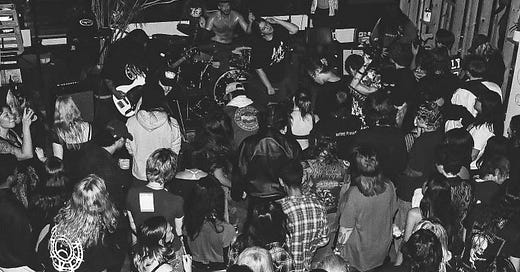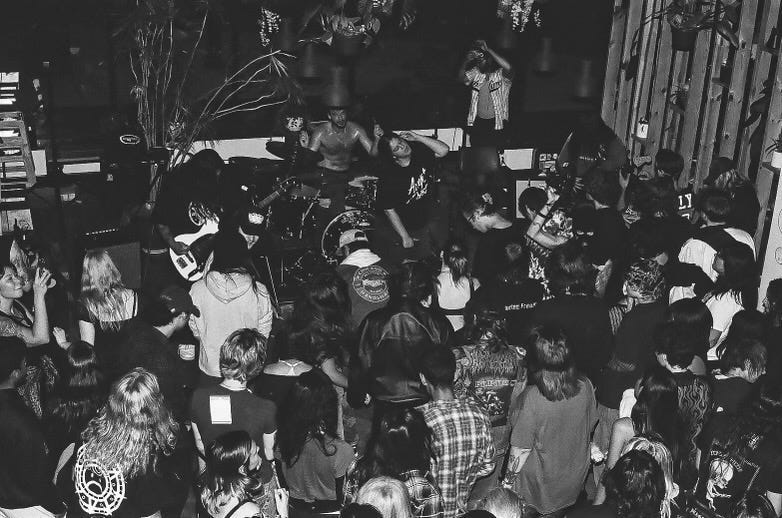Interview w/Brain Graffiti
The duo talks physical media, zines and what inspired them to start a DIY music space
Returning to the heart of DIY and grassroots music and art spaces is essential in an era dominated by algorithm-driven aesthetics, spaces, and communities. When I reached out on Substack to hear from musicians and fans about their experiences with DIY music spaces, Brain Graffiti in Elgin, Illinois, stood out. This 20-something duo has deep roots in the Chicagoland music scene, embodying an ethos that to me just felt…right. I truly believe that physical media, local culture building, and grassroots art and music spaces offer a vital resistance to an algorithm-moderated culture that has compromised real subcultures over the past decade and lead to things like mutual aid networks. Matt and Jess of Brain Graffiti graciously shared what drives their commitment to fostering a music scene and sustaining these spaces.
This interview has been lightly edited for brevity and clarity.
Jacqueline: How did Brain Graffiti start, and what inspired you? Your first Substack post mentions prioritizing physical zines over online sharing. What's the philosophy behind that, and why do you think spaces like yours are important?
Matt: We started Brain Graffiti back in the summer of 2023, right after finishing a semester at community college. There were a lot of inspirations behind it, from other local zines—shoutout to Pink Slip Zine!—to older zines from the '70s and '80s, like Sniffin' Glue and My Rules. But our involvement in the Chicago/suburban music scene was the biggest driving force. We got into it when we were 19, about two and a half years ago. It's been a wild ride; we started to learn Chicago by going to shows, getting to know neighborhoods and streets, and seeing where the scene is the most alive.
We place a high regard on physical media. Both being 21 and in Gen Z, we've realized that the oversaturation of social media is running amok in today's culture. I grew up with technology everywhere—getting a Wii when I was in Kindergarten, an Xbox in third grade, a phone in fifth grade, and social media in middle school. I was inundated with the new culture of technology at a young age, and it definitely affected me; social media made me self-conscious, placed a high standard on meaningless metrics, and video games made me angry and took away outside time I can't get back. These experiences have made me place a high value on physical things. I own hundreds of records, CDs, cassettes, magazines, etc. We want our music to always be physical because putting our hours of hard work on the internet would, we feel, degrade the value. We don't want that.
About "spaces"—if we're talking about music spaces and/or venues—I feel it's important because it gives people in bands a way to play live without having to rely on established venues. Along with the zine, we also promote shows under the Brain Graffiti name to get people to know what we do and show we're about community. I am digressing here! But we rarely get anything back with established venues because they only see dollar signs. Which, of course, is understandable—they're businesses. But for artists starting out, DIY is best because it's the most welcoming and friendly.
Jess: We want to keep physical media alive! We felt that by keeping our zine strictly physical, we'd be doing our part in keeping it around. We're both huge physical media collectors and understand the community that enjoys it. Music spaces are also critical to keep accessible to both bands and fans who want to experience live music. As Matt said, we've had experiences in both DIY and established venues, and both should do their part in being open-minded to the artists they book. We've had mostly positive experiences with venues of all kinds, whether booking or just attending. If these event spaces didn't exist, people wouldn't be able to express themselves on stage or as attendees. We're passionate about keeping our local DIY scene alive by creating spaces for artists in unlikely places—like our zine release/concert in a food court!
Jacqueline: Thanks so much for sharing! Jess, like Matt, was there a specific moment when you decided physical media was the right route? Or was it more of an over-saturation of things that led you there?
Also, can you name a live performance in a DIY space that changed everything for you? I saw Extra Life at Death by Audio in NYC, and I'd never heard anything like it. The venue facilitated that moment for the band, providing an intimate space for the audience to connect with the music. Do you have a similar story that galvanized or inspired you?
Jess: For me, it was when I went to my first-ever record store in high school. Seeing the love for physical media made me want to keep it a hands-on thing, especially with Brain Graffiti.
As for DIY spaces, the show that stands out to me was my first DIY show! It was a basement show in Elgin at a place called The Darkroom about two years ago. I had never been exposed to music or a community like that, and it was so eye-opening. It felt like something I didn't just want to be part of—it was something I needed to be part of.
Also, the food court show was our Issue 3 release show, which we held in our hometown, Elgin! It was at a place called Dream Hall, and we had three hardcore bands and a shoegaze band. It was an amazing show!
Matt: That's a tough one! Jess and I had the same first DIY experience—The Darkroom in South Elgin, IL—which was incredible and definitely opened our eyes to DIY. But it's tough to pinpoint just one experience that floored me. Our first Chicago DIY venue was Bookclub, a studio apartment near Wrigley Field. That show was a trip and was also the first time I took concert photos.
Another incredible experience was at Stage 773, a bar near Wrigleyville that had never hosted a gig before. It still felt DIY because of the bands. One was called Stalled, a Chicago post-punk/slowcore/alt-rock trio. We've become friends with them through Brain Graffiti (we interviewed them for Issue 2), and their music always floors me. If anyone knows the '90s band Unwound, Stalled has similar vibes. They have these intense punk freakouts but can also turn into ambient, spacey sounds with poetic lyrics. Their performances are an absolute trip.
Another pivotal spot was Grandma's House, a basement venue right off I-90 in Jefferson Park, Chicago. It's a super dingy basement—stone floors, exposed pipes snaking along the ceiling, and random knick-knacks from the homeowner, like a washer and dryer people would lean on. Bands like Moon Rules Apply and Atheena performed, and we've become friends with them too. It was an awesome experience where everyone was just in it together, moshing and letting loose. It's the kind of thing you have to be there for to truly feel.
Jacqueline: Could you both share your hopes for Brain Graffiti and your vision for DIY culture, whether locally or on a broader scale?
Matt: Luckily for where we are, there are Gen Zers who are carrying the torch, hosting shows, starting bands and zines, and whatnot. We need that for EVERYWHERE, and luckily, there are places all around the US that are doing that, so luckily, it won't be going away in the foreseeable future. In terms of Brain Graffiti, we hope to be a zine that reaches a point where some kid in Kansas City who goes to DIY shows is like, "I wonder when the next issue of Brain Graffiti is coming out." I want Brain Graffiti to get as big as it can get- without sacrificing our morals. If Rolling Stone, Pitchfork, or NME were to come to us and ask to buy us out or have a "Brain Graffiti" section in their publication, I would politely say, "No, thank you."
Jess: The main thing is that we want diy to always be available for everyone and anyone. It is our lives basically, we met all our friends through diy/ the scene.
For Brain Graffiti, I just want to keep doing it forever, and keeping it diy forever. I want us to get big while keeping to our diy ethics and always keeping touch with bands and the audience no matter how big we get. Overall, we just hope that we inspire others to create and keep the DIY scene alive no matter where they are.





